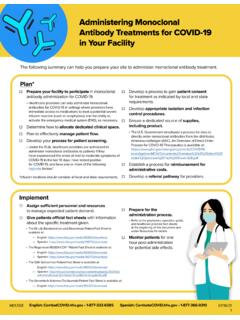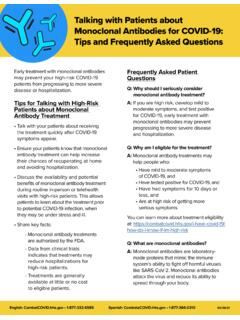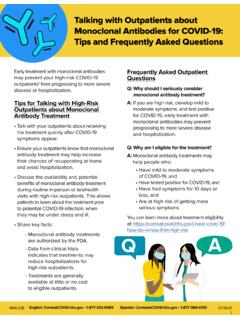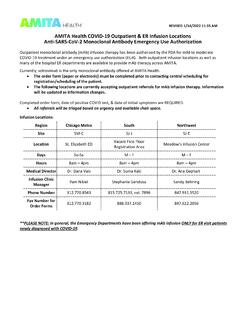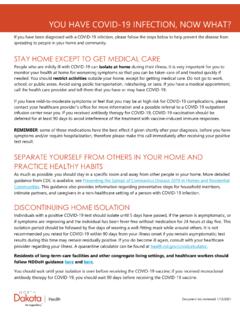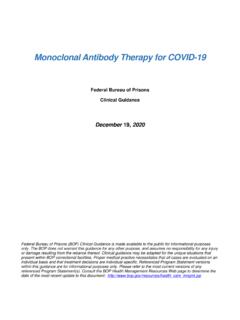Transcription of Talking with Patients about Monoclonal Antibodies for ...
1 Talking with Patients about Monoclonal Antibodies for COVID-19: Tips and Frequently Asked Questions Early treatment with Monoclonal Antibodies Frequently Asked Patient may prevent your high-risk COVID-19 Questions Patients from progressing to more severe disease or hospitalization. Q: Why should I seriously consider Monoclonal antibody treatment? Tips for Talking with High-Risk A: If you are high risk, develop mild to Patients about Monoclonal moderate symptoms, and test positive Antibody Treatment for COVID-19, early treatment with Monoclonal Antibodies may prevent Talk with your Patients about receiving progressing to more severe disease the treatment quickly after COVID-19 and hospitalization.
2 Symptoms appear. Ensure your Patients know that Monoclonal Q: Why am I eligible for the treatment? antibody treatment may help increase A: Monoclonal antibody treatments may their chances of recuperating at home help people who: and avoid hospitalization. Have mild to moderate symptoms Discuss the availability and potential of COVID-19, and benefits of Monoclonal antibody treatment Have tested positive for COVID-19, and during routine in-person or telehealth Have had symptoms for 10 days or visits with high-risk Patients . This allows less, and Patients to learn about the treatment prior Are at high risk of getting more to potential COVID-19 infection, when serious symptoms they may be under stress and ill.
3 You can learn more about treatment eligibility Share key facts: at: how-do-i-know-if-im-high-risk - Monoclonal antibody treatments are authorized by the FDA. Q: What are Monoclonal Antibodies ? - Data from clinical trials A: Monoclonal Antibodies are laboratory- indicates that treatments may made proteins that mimic the immune reduce hospitalizations for system's ability to fight off harmful viruses high-risk Patients . like SARS-CoV-2. Monoclonal Antibodies - Treatments are generally attack the virus and reduce its ability to available at little or no cost spread through your body. to eligible Patients . English: 1-877-332-6585 Spanish: 1-877-366-0310 05/24/21. 1. Talking with Patients about Monoclonal Antibodies for COVID-19: Tips and Frequently Asked Questions Q: How do I get treatment?
4 Q: Are there side effects? A: If you have had symptoms for 10 A: Some side effects are , 2. days or less and have tested positive An infusion of any medicine may cause for COVID-19 and you are high risk, brief pain, bleeding, bruising of the I can refer you to receive treatment. skin, soreness, swelling, and possible The infusion itself will take from about infection at the infusion site. Allergic 15 minutes to an hour, and you will be reactions may happen during and after at the facility for two to three hours. an antibody infusion. Trained healthcare staff will monitor you for allergic reactions. Q: Where can I get treatment? While side effects are possible, antibody A: We can locate the nearest treatment site by treatments do not contain any live virus.
5 Using the information provided by the There is no risk you will get COVID-19. Department of Health and Human Services, from Monoclonal antibody treatments. which is carefully tracking distribution on their website at: Q: What are the chances it will work? gov/pages/therapeutics-distribution. A: Patient data from clinical trials showed You can also reach them over the that high-risk COVID-19 Patients treated phone at 1-877-332-6585 (for English) with Monoclonal Antibodies had a 70%. or 1-877-366-0310 (for Spanish). reduction in relative risk of progression to severe disease or hospitalization compared Q. to Patients who did not receive Monoclonal A. The treatment is most effective when given shortly after symptoms appear, so it is important to get tested and treated as soon as possible.
6 Q: If I receive Monoclonal Antibodies , do I have to isolate? A: Y. es. You must still follow isolation requirements to protect yourself and others. Q: Can I still get the COVID-19 vaccine if I receive Monoclonal Antibodies ? A: Y. es, but you should wait 90 days after treatment to get the vaccine. English: 1-877-332-6585 Spanish: 1-877-366-0310 05/24/21. 2. Talking with Patients about Monoclonal Antibodies for COVID-19: Tips and Frequently Asked Questions Q: If I have received the vaccine, can For more information, visit I still receive the Monoclonal antibody treatment? English: 1-877-332-6585 Spanish: 1-877-366-0310. A: Yes. Patients who develop COVID-19. infection despite vaccination may receive Monoclonal antibody treatment.
7 Q: How much will the treatment cost? Is it covered by insurance? A: Because the federal government has References purchased a supply of Monoclonal antibody 1. Fact Sheet for Health Care Providers Emergency Use Authorization (EUA) of REGEN-COV . treatments, there is no cost to the patient (Casirivimab with Imdevimab) (Revised version, May 14, 2021). for the antibody product itself. Depending on your insurance coverage, you may 2. Fact Sheet for Health Care Providers Emergency Use Authorization or may not need to pay for a provider to (EUA) of Bamlanivimab and Etesevimab (Revised version, May 14, 2021). administer the infusion. For many, infusion 3. Center for Drug Evaluation and Research (CDER).
8 (2021). Emergency administration will have no cost. Use Authorization (EUA) for Bamlanivimab 700 mg and Etesevimab In particular: 1400 mg IV Administered Together, Center for Drug Evaluation and Research (CDER) Review. Food and Drug Administration. Medicare is covering all infusion costs. Learn more about Medicare coverage of the treatment at: gov/files/document/covid-infographic- coverage- Monoclonal -antibody- Medicaid coverage of infusion cost varies by state. F. or Patients covered under commercial insurance plans, costs of infusion may vary, but many large insurers are waiving all costs. Check with your health plan. If you do not have insurance, you should ask the treatment facility if there are charges.
9 English: 1-877-332-6585 Spanish: 1-877-366-0310 05/24/21. 3.

